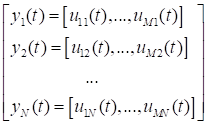Matrix unpacking
 |
 |
| Vectorized | C | |
in the palette |
on the schematic |
The block implements the conversion of a single input vector signal to multiple vector output signals according to an algorithm:

or

where y(t) is a vector output signal, u(t) is a vector input signal. The input vector u(t), interpreted as a matrix of size [N×M] and "packed" by rows or columns (depending on the packing variant), is transformed into M or N vector outputs yj(t) (depending on the unpacking variant: by rows or by columns).

or

where y(t) is a vector output signal, u(t) is a vector input signal. The input vector u(t), interpreted as a matrix of size [N×M] and "packed" by rows or columns (depending on the packing variant), is transformed into M or N vector outputs yj(t) (depending on the unpacking variant: by rows or by columns).
Inputs
- inport - port for input vector signal.
Outputs
- outport_n - output port for a row of a matrix. The number of block outputs is equal to the number of rows or columns of the input matrix, depending on the block property settings.
Properties
- Number of rows in the matrix – number M.
- Number of columns in the matrix – number N.
- Matrix is packed via – option of packing the input matrix: by rows or by columns.
- Unpack the matrix via – option of "unpacking" the input matrix.
Parameters
none
Note:
- By default, the block unpacks a matrix of size [2×2] and forms two output signals (of size 2 each). In this case the matrix is packed and unpacked by rows.
- Named properties can be set as local model variables (submodels) in a programming language script, as global project signals using the Tools → Signals main menu item, or as external project signals using an attachable signal database.